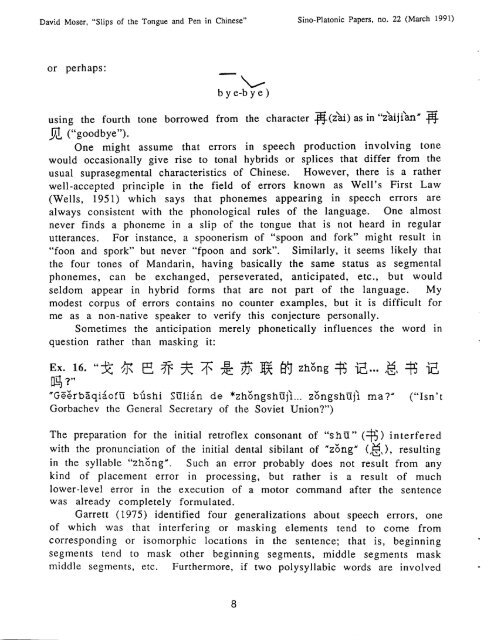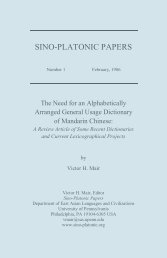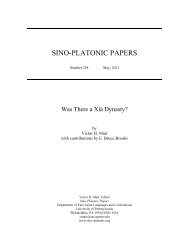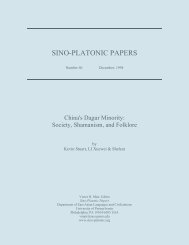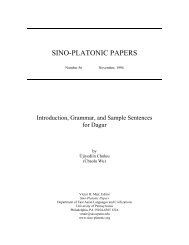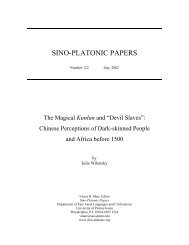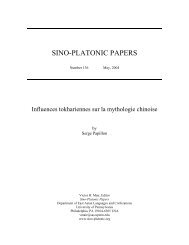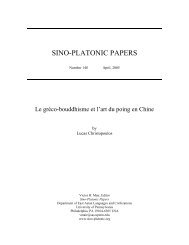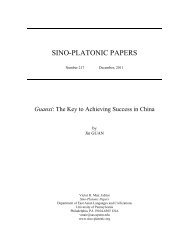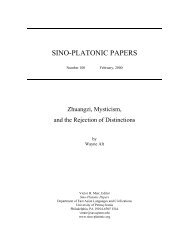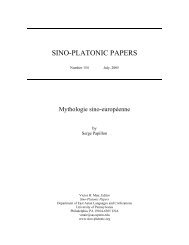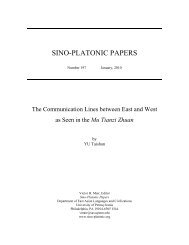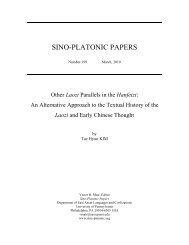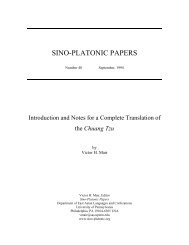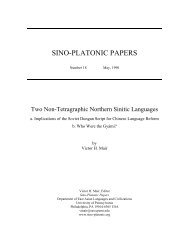Slips of the Tongue and Pen in Chinese - Sino-Platonic Papers
Slips of the Tongue and Pen in Chinese - Sino-Platonic Papers
Slips of the Tongue and Pen in Chinese - Sino-Platonic Papers
Create successful ePaper yourself
Turn your PDF publications into a flip-book with our unique Google optimized e-Paper software.
David Moser, "<strong>Slips</strong> <strong>of</strong> <strong>the</strong> <strong>Tongue</strong> <strong>and</strong> <strong>Pen</strong> <strong>in</strong> Ch<strong>in</strong>ese"<br />
or perhaps: - L<br />
bye-bye)<br />
S<strong>in</strong>o-<strong>Platonic</strong> <strong>Papers</strong>, no. 22 (March 1991)<br />
us<strong>in</strong>g <strong>the</strong> fourth tone borrowed from <strong>the</strong> character $(z'ai) as <strong>in</strong> "z'aiji'anY<br />
("goodbye").<br />
One might assume that errors <strong>in</strong> speech production <strong>in</strong>volv<strong>in</strong>g tone<br />
would occasionally give rise to tonal hybrids or splices that differ from <strong>the</strong><br />
usual suprasegmental characteristics <strong>of</strong> Ch<strong>in</strong>ese. However, <strong>the</strong>re is a ra<strong>the</strong>r<br />
well-accepted pr<strong>in</strong>ciple <strong>in</strong> <strong>the</strong> field <strong>of</strong> errors known as Well's First Law<br />
(Wells, 1951) which says that phonemes appear<strong>in</strong>g <strong>in</strong> speech errors are<br />
always consistent with <strong>the</strong> phonological rules <strong>of</strong> <strong>the</strong> language. One almost<br />
never f<strong>in</strong>ds a phoneme <strong>in</strong> a slip <strong>of</strong> <strong>the</strong> tongue that is not heard <strong>in</strong> regular<br />
utterances. For <strong>in</strong>stance, a spoonerism <strong>of</strong> "spoon <strong>and</strong> fork" might result <strong>in</strong><br />
"foon <strong>and</strong> spork" but never "fpoon <strong>and</strong> sork". Similarly, it seems likely that<br />
<strong>the</strong> four tones <strong>of</strong> M<strong>and</strong>ar<strong>in</strong>, hav<strong>in</strong>g basically <strong>the</strong> same status as segmental<br />
phonemes, can be exchanged, perseverated, anticipated, etc., but would<br />
seldom appear <strong>in</strong> hybrid forms that are not part <strong>of</strong> <strong>the</strong> language. My<br />
modest corpus <strong>of</strong> errors conta<strong>in</strong>s no counter examples, but it is difficult for<br />
me as a non-native speaker to verify this conjecture personally.<br />
Sometimes <strong>the</strong> anticipation merely phonetically <strong>in</strong>fluences <strong>the</strong> word <strong>in</strong><br />
question ra<strong>the</strong>r than mask<strong>in</strong>g it:<br />
Ex. 16. ''k $ E % 5 5 a & zhzng 3 z<br />
n-J ??'<br />
m m m ,g,<br />
3 3<br />
"~~GrbZiqii<strong>of</strong>a bfishi ~~li6n de *zhzngshIiji... zGngshTIj1 ma?" ("Isn't<br />
Gorbachev <strong>the</strong> General Secretary <strong>of</strong> <strong>the</strong> Soviet Union?")<br />
The preparation for <strong>the</strong> <strong>in</strong>itial retr<strong>of</strong>lex consonant <strong>of</strong> "shU" (3 ) <strong>in</strong>terfered<br />
with <strong>the</strong> pronunciation <strong>of</strong> <strong>the</strong> <strong>in</strong>itial dental sibilant <strong>of</strong> "zzng' result<strong>in</strong>g -<br />
<strong>in</strong> <strong>the</strong> syllable ''zhzng". Such an error probably does not result from any<br />
k<strong>in</strong>d <strong>of</strong> placement error <strong>in</strong> process<strong>in</strong>g, but ra<strong>the</strong>r is a result <strong>of</strong> much<br />
lower-level error <strong>in</strong> <strong>the</strong> execution <strong>of</strong> a motor comm<strong>and</strong> after <strong>the</strong> sentence<br />
was already completely formulated.<br />
Garrett (1 975) identified four generalizations about speech errors, one<br />
<strong>of</strong> which was that <strong>in</strong>terfer<strong>in</strong>g or mask<strong>in</strong>g elements tend to come from<br />
correspond<strong>in</strong>g or isomorphic locations <strong>in</strong> <strong>the</strong> sentence; that is, beg<strong>in</strong>n<strong>in</strong>g<br />
segments tend to mask o<strong>the</strong>r beg<strong>in</strong>n<strong>in</strong>g segments, middle segments mask<br />
middle segments, etc. Fur<strong>the</strong>rmore, if two polysyllabic words are <strong>in</strong>volved


